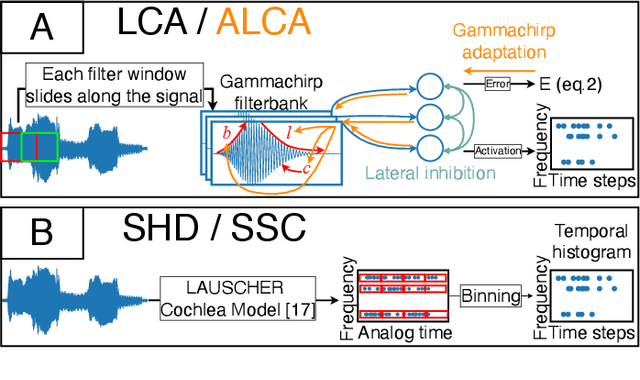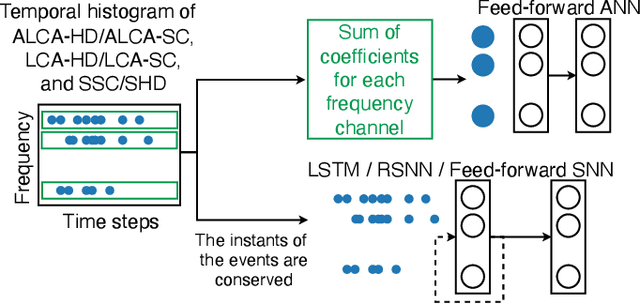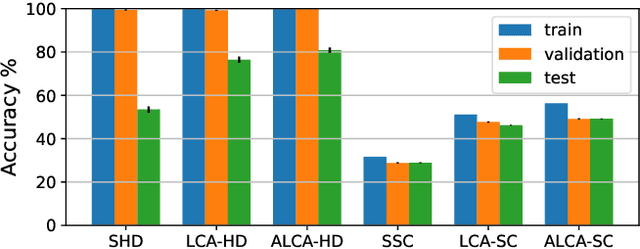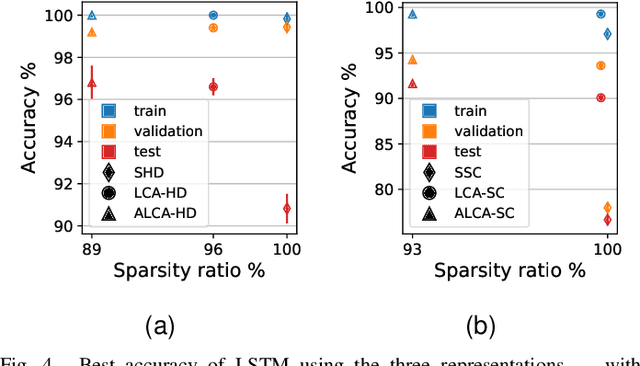Soufiyan Bahadi
Adaptive Central Frequencies Locally Competitive Algorithm for Speech
Feb 10, 2025


Abstract:Neuromorphic computing, inspired by nervous systems, revolutionizes information processing with its focus on efficiency and low power consumption. Using sparse coding, this paradigm enhances processing efficiency, which is crucial for edge devices with power constraints. The Locally Competitive Algorithm (LCA), adapted for audio with Gammatone and Gammachirp filter banks, provides an efficient sparse coding method for neuromorphic speech processing. Adaptive LCA (ALCA) further refines this method by dynamically adjusting modulation parameters, thereby improving reconstruction quality and sparsity. This paper introduces an enhanced ALCA version, the ALCA Central Frequency (ALCA-CF), which dynamically adapts both modulation parameters and central frequencies, optimizing the speech representation. Evaluations show that this approach improves reconstruction quality and sparsity while significantly reducing the power consumption of speech classification, without compromising classification accuracy, particularly on Intel's Loihi 2 neuromorphic chip.
Efficient Sparse Coding with the Adaptive Locally Competitive Algorithm for Speech Classification
Sep 12, 2024



Abstract:Researchers are exploring novel computational paradigms such as sparse coding and neuromorphic computing to bridge the efficiency gap between the human brain and conventional computers in complex tasks. A key area of focus is neuromorphic audio processing. While the Locally Competitive Algorithm has emerged as a promising solution for sparse coding, offering potential for real-time and low-power processing on neuromorphic hardware, its applications in neuromorphic speech classification have not been thoroughly studied. The Adaptive Locally Competitive Algorithm builds upon the Locally Competitive Algorithm by dynamically adjusting the modulation parameters of the filter bank to fine-tune the filters' sensitivity. This adaptability enhances lateral inhibition, improving reconstruction quality, sparsity, and convergence time, which is crucial for real-time applications. This paper demonstrates the potential of the Locally Competitive Algorithm and its adaptive variant as robust feature extractors for neuromorphic speech classification. Results show that the Locally Competitive Algorithm achieves better speech classification accuracy at the expense of higher power consumption compared to the LAUSCHER cochlea model used for benchmarking. On the other hand, the Adaptive Locally Competitive Algorithm mitigates this power consumption issue without compromising the accuracy. The dynamic power consumption is reduced to a range of 0.004 to 13 milliwatts on neuromorphic hardware, three orders of magnitude less than setups using Graphics Processing Units. These findings position the Adaptive Locally Competitive Algorithm as a compelling solution for efficient speech classification systems, promising substantial advancements in balancing speech classification accuracy and power efficiency.
Adaptive Approach For Sparse Representations Using The Locally Competitive Algorithm For Audio
Sep 29, 2021



Abstract:Gammachirp filterbank has been used to approximate the cochlea in sparse coding algorithms. An oriented grid search optimization was applied to adapt the gammachirp's parameters and improve the Matching Pursuit (MP) algorithm's sparsity along with the reconstruction quality. However, this combination of a greedy algorithm with a grid search at each iteration is computationally demanding and not suitable for real-time applications. This paper presents an adaptive approach to optimize the gammachirp's parameters but in the context of the Locally Competitive Algorithm (LCA) that requires much fewer computations than MP. The proposed method consists of taking advantage of the LCA's neural architecture to automatically adapt the gammachirp's filterbank using the backpropagation algorithm. Results demonstrate an improvement in the LCA's performance with our approach in terms of sparsity, reconstruction quality, and convergence time. This approach can yield a significant advantage over existing approaches for real-time applications.
 Add to Chrome
Add to Chrome Add to Firefox
Add to Firefox Add to Edge
Add to Edge